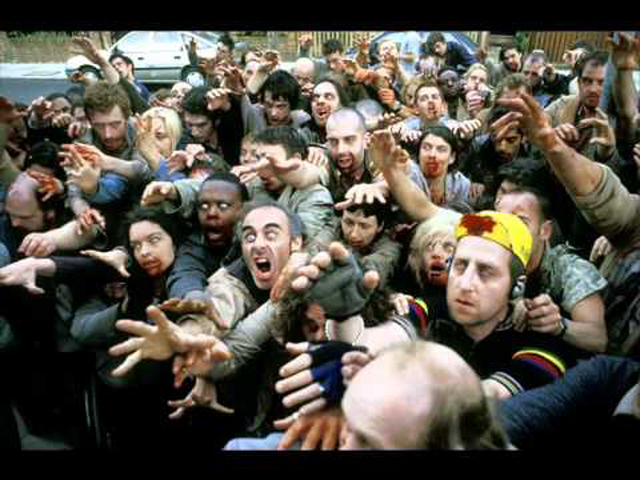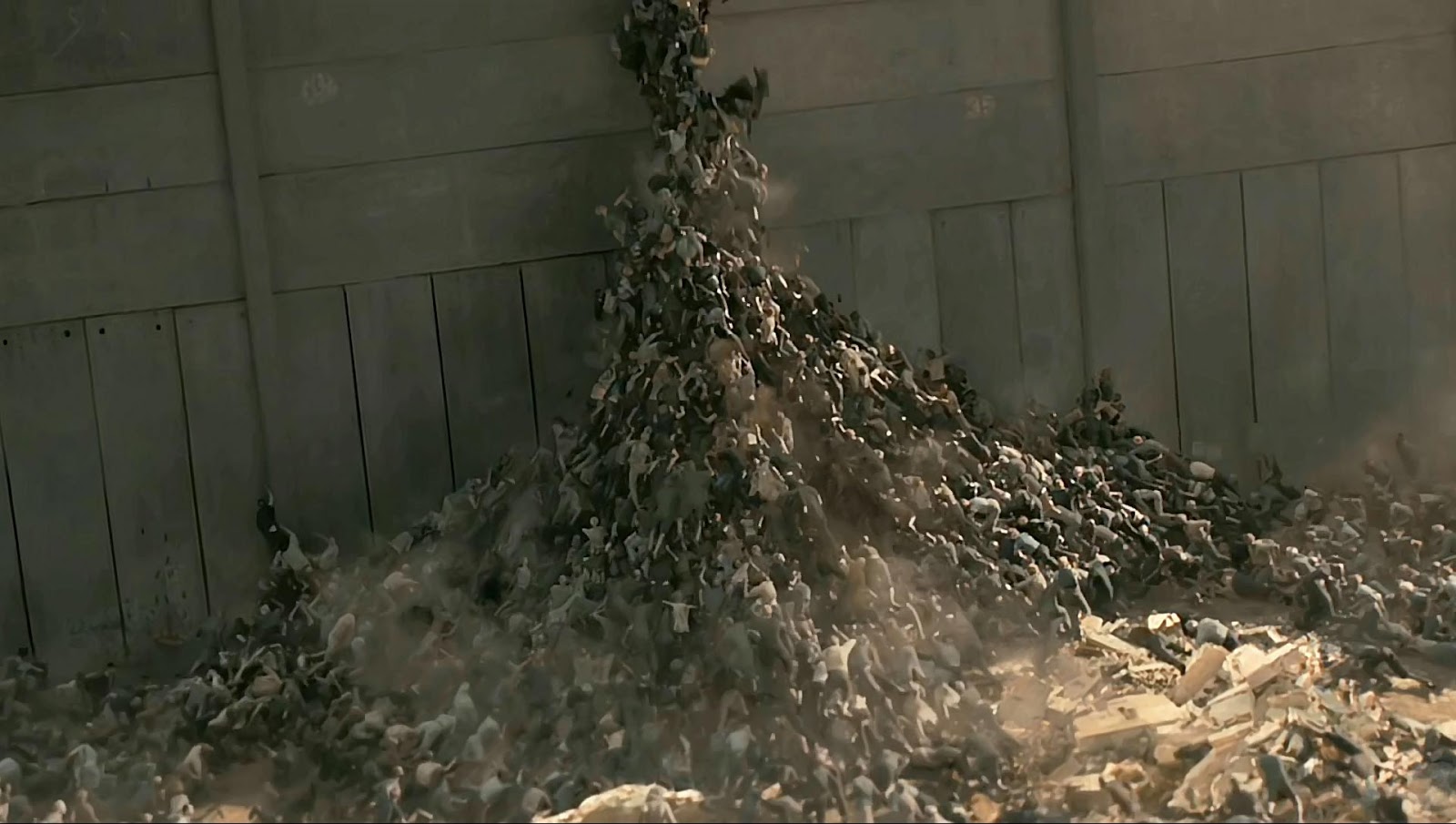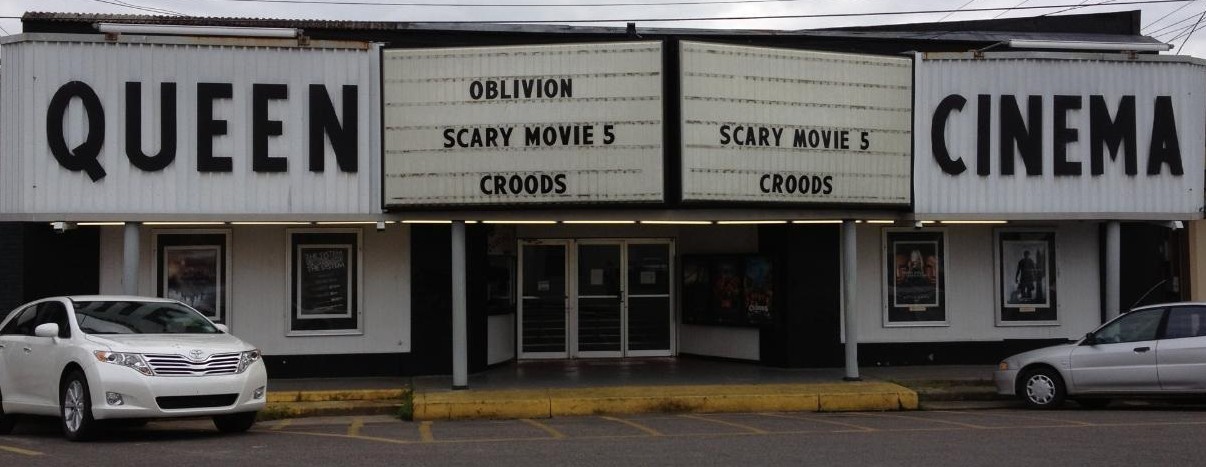It was bound to happen sooner or later: A mega-budget, summer Hollywood action picture would actually be good. The perhaps unlikely winner is World War Z, a zombie movie with a strong environmental subtext and an unusual amount of ambiguity about worldwide social disintegration. There is even a hero who works for that most unjustly vilified institution, the United Nations.
 Don’t get overexcited. Director Marc Forster approach is to break the movie down into a series of set pieces, each featuring star Brad Pitt, who ends up with a sequence of family/allies/zombie meals. The first three or four scenes show Pitt’s character, Gerry Lane, saving his wife and two young daughters from the first mass onslaught of the fast-moving and rapidly-reproducing zombies (it takes 11 seconds for a person to die and rise to zombiedom) and getting them to safety. After that, he travels to South Korea, where he meets a unit of American soldiers; Jerusalem; and Wales, where he hopes to find one of the last surviving World Health Organization laboratories (and there are more stops along the way). Some of the scenes are strictly functional, meant to establish Lane as a Really Nice Guy or even just to set the stage for the next scene.
Don’t get overexcited. Director Marc Forster approach is to break the movie down into a series of set pieces, each featuring star Brad Pitt, who ends up with a sequence of family/allies/zombie meals. The first three or four scenes show Pitt’s character, Gerry Lane, saving his wife and two young daughters from the first mass onslaught of the fast-moving and rapidly-reproducing zombies (it takes 11 seconds for a person to die and rise to zombiedom) and getting them to safety. After that, he travels to South Korea, where he meets a unit of American soldiers; Jerusalem; and Wales, where he hopes to find one of the last surviving World Health Organization laboratories (and there are more stops along the way). Some of the scenes are strictly functional, meant to establish Lane as a Really Nice Guy or even just to set the stage for the next scene.
But while these events are hinged rather than conjoined, they are edited together adroitly, the considerable macro-suspense rising, falling, rising and falling always with competence and sometimes with flair.
 The key description of the movie just might be “competence.” If you think that’s a left-handed compliment, well, look around. Most Hollywood movies these days are a mess. Expectations have fallen so low that a film made with the unimaginative monotony of a film school exercise are frequently and wrongheadedly lauded as “ambitious.” Say what you will about Forster’s previous movies (Monster’s Ball, Finding Neverland, The Kite Runner), they display authentic artistic ambition (not always achieved, of course). His list of real stinkers is limited to a single effort, Quantum of Silence.
The key description of the movie just might be “competence.” If you think that’s a left-handed compliment, well, look around. Most Hollywood movies these days are a mess. Expectations have fallen so low that a film made with the unimaginative monotony of a film school exercise are frequently and wrongheadedly lauded as “ambitious.” Say what you will about Forster’s previous movies (Monster’s Ball, Finding Neverland, The Kite Runner), they display authentic artistic ambition (not always achieved, of course). His list of real stinkers is limited to a single effort, Quantum of Silence.
What you might not expect is his handling a big scale action. A zombie assault on Jerusalem stands out in its massive fearsomeness, but World War Z’s action sequences, without a single exception, boast toe-curling suspense. And while a movie like this must feature shots of zombies chowing down on their human prey, they are carefully rationed. In fact, Forster does such a good job that he’s been subjected to the sort of insider sniping that often accompanies success in Hollywood.
The most intriguing side of World War Z is its attitude towards the zombies. The original outbreak was due to a viral epidemic openly and quickly attributed to complications of pollution and global warming. Lane, a U.N. investigator, describes the zombie outbreak as a variation on regional wars, famines, and plagues he has seen in other parts of the world, going so far as to refer to the zombies as victims.
 But the scenes of these victims play on Western fears of the global rabble, intent on destroying the civilization responsible for its misery. The attack on Jerusalem cannot help but recall Israeli fears of being “overrun” by Palestinians. The firefights in Korea replicate fears of the North’s communist “hordes.” And so forth. Would that more “quality” American films were up to an equivalent effort.
But the scenes of these victims play on Western fears of the global rabble, intent on destroying the civilization responsible for its misery. The attack on Jerusalem cannot help but recall Israeli fears of being “overrun” by Palestinians. The firefights in Korea replicate fears of the North’s communist “hordes.” And so forth. Would that more “quality” American films were up to an equivalent effort.
As to Peter’s question as to whether World War Z is a date movie, I’d answer yes. As long as you’re not expecting to enjoy an episode of sexual intimacy later that evening.
–Henry Sheehan
